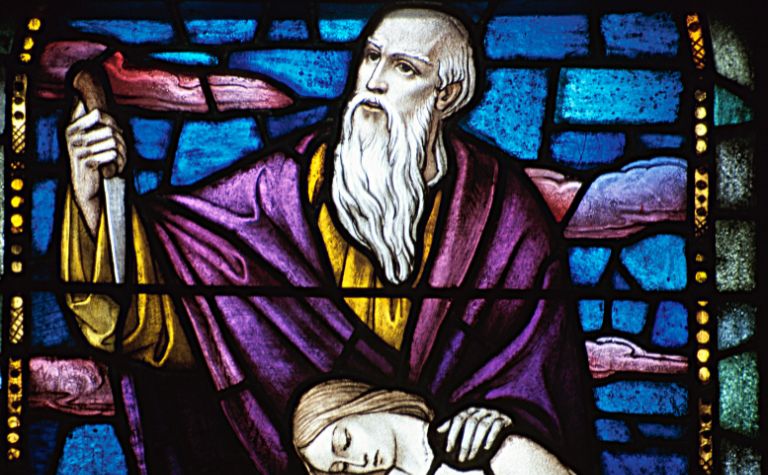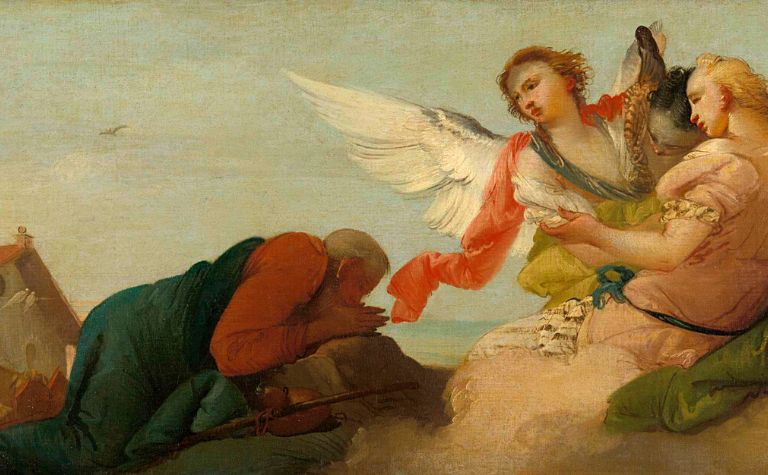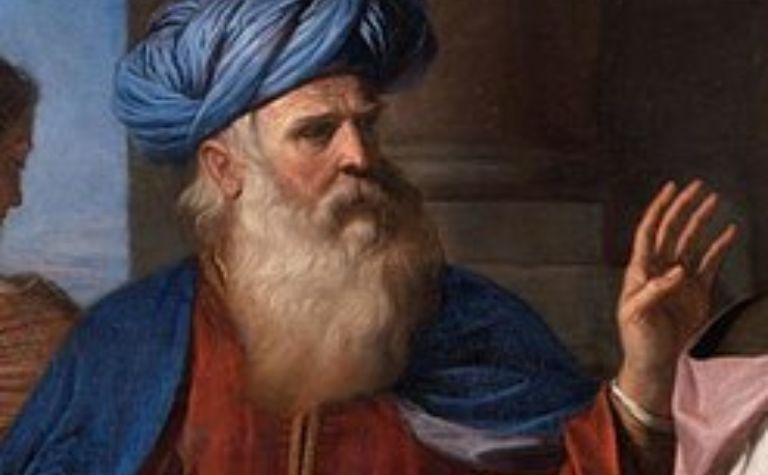Jews and Christians celebrate Abraham because of his important role in the book of Genesis, which reverberates throughout the Bible. As the first Hebrew patriarch, and a great man of faith (Rom. 4), God used him to father the nation of Israel (Gen. 12:1-3). While Bible readers want to know about Abraham’s life, they are also interested in learning about his death.
Abraham was 175 years old when he died. The Bible verse that describes his death gives four descriptions: he breathed his last; he died at a good old age; he was an old man full of years; and he was gathered to his people. His legacy includes his faith in God and fathering the Israelite people.
Where does Genesis say Abraham’s age at death? How many years did he live in the Promised Land? What is the significance of Genesis’ descriptions of Abraham’s death? Which ones are similar to Moses and David? Did he live longer or shorter than his immediate family members? Keep reading to learn the answers to these questions and others.
Also, another important question readers of Genesis have is when Abraham lived. What do scholars teach about the year of his birth and death? Did he live before or after Noah, Methuselah, and Seth?

Abraham is 175 Years Old When He Dies
Readers find Abraham’s biography in Genesis 11:10 to 25:11. It focuses on the promises God made him (Gen. 12:1-3) and illustrates how he was faithful to those promises throughout Abraham’s life. The last passage of his narrative lists his immediate descendants and reflects on his life as it reports his death.
Genesis’ description of Abraham’s death includes his age and how he lived a whole and blessed life. Genesis 25:7-8 read, “These are the days of the years of Abraham’s life, 175 years. Abraham breathed his last and died in a good old age, an old man and full of years, and was gathered to his people.” (ESV)
Abraham spent 100 years living in the Promised Land
Abraham and his family lived much longer than people do today. Psalm 90:10 says most people live 70 or 80 years. “The years of our life are seventy, or even by reason of strength eighty; yet their span is but toil and trouble; they are soon gone, and we fly away.” (ESV) Though the average age of death varies around the world, 70 and 80 more closely reflect the length of people’s lives in modern times.
| Patriarch | Age at Death |
|---|---|
| Nahor, Abraham’s grandfather | 148 |
| Terah, Abraham’s father | 205 |
| Abraham | 175 |
| Isaac, Abraham’s son | 180 |
| Jacob, Abraham’s son | 147 |
Prior to Genesis 25:7, the last reference to Abraham’s age in his story was at the beginning. Genesis 12:4 mentions that Abraham was 75 when he left Haran for the Promised Land. “So Abram went, as the Lord had told him, and Lot went with him. Abram was seventy-five years old when he departed from Haran.” (ESV)
However, other passages mention Abraham growing older. For example, his old age is the backdrop of his urgent attempt to find a wife for his son, Isaac. Genesis 24:1 reads, “Now Abraham was old, well advanced in years. And the Lord had blessed Abraham in all things.” (ESV)
Since Abraham died at 175, he spent 100 years in the Promised Land. He sometimes journeyed out of the land, like when he traveled to Egypt, but his permanent residence was in Canaan.
A pivotal moment in Abraham’s life is when Sarah gives birth to Isaac. Many people want to know Abraham’s age when Isaac was born. Please see the article for details.

The Description of Abraham’s Death in Genesis
Commentator Richard Belcher writes, “The death of Abraham is presented as the ideal death. Death is always considered an enemy in light of the curse of the fall (Gen. 3), but if one dies in the way that Abraham dies, then one is considered to be very blessed.” [1]
Genesis 25:8 describes Abraham’s death in four ways:
- He breathed his last.
- He died in a good old age.
- He was an old man and full of years.
- He was gathered to his people.
He breathed his last
In the first description, most translations say Abraham “breathed his last,” accurately reflecting the original Hebrew phrase. However, the KJV renders the phrase according to a cultural saying, i.e., “Then Abraham gave up the ghost.” The NKJV updates the language, “Then Abraham breathed his last.”
The phrase also describes Ishmael’s death: “These are the years of the life of Ishmael: 137 years. He breathed his last and died, and was gathered to his people.” (Gen 25:17).
It also describes Isaac’s death: “And Isaac breathed his last, and he died and was gathered to his people, old and full of days. And his sons Esau and Jacob buried him” (Gen. 35:29).
It also describes Jacob’s death: “When Jacob finished commanding his sons, he drew up his feet into the bed and breathed his last and was gathered to his people” (Gen. 49:33).
Job uses the phrase to describe death in general: “But a man dies and is laid low; man breathes his last, and where is he?’ (Job 14:10)
He died at a good old age
In the second description, most translations say that Abraham “died at a good old age,” accurately reflecting the original Hebrew phrase. One says, “he died at a ripe old age” (NLT).
God said Abraham would die this way: “As for you, you shall go to your fathers in peace; you shall be buried in a good old age” (Gen. 15:15).
The phrase also describes Gideon’s death: “And Gideon the son of Joash died in a good old age and was buried in the tomb of Joash his father, at Ophrah of the Abiezrites” (Judg. 8:32).
It also describes David’s death: “Then he died at a good age, full of days, riches, and honor. And Solomon his son reigned in his place” (1 Chron. 29:28).
Readers encounter Abraham’s family throughout his narrative in Genesis. Many people know about Isaac but also wonder how many sons Abraham had in total. See the article to learn more.
He was an old man full of years
In the third description, most translations say Abraham was “an old man and full of years,” accurately reflecting the original Hebrew phrase. One says, “having lived a long and satisfying life’ (NLT). Another says he was “an old man and satisfied with life” (NASB).
The same phrase describes Isaac’s death (see verse above).
It also describes David: “When David was old and full of days, he made Solomon his son king over Israel” (1 Chron. 23:1).
It also describes Jehoiada: “But Jehoiada grew old and full of days, and died. He was 130 years old at his death” (2 Chron. 24:15).
It also describes Job’s death: “And Job died, an old man, and full of days” (Job 42:17).
He was gathered to his people
In the fourth description, most translations say that Abraham “was gathered to his people,” accurately reflecting the original Hebrew phrase. One says he “joined his ancestors in death” (NLT).
The same phrase describes Isaac’s death. It also describes Jacob’s death (see verses above).
It also describes Aaron’s death: “Let Aaron be gathered to his people, for he shall not enter the land that I have given to the people of Israel, because you rebelled against my command at the waters of Meribah.” (Num. 20:24)
It also describes Moses’ death: “And die on the mountain which you go up, and be gathered to your people, as Aaron your brother died in Mount Hor and was gathered to his people.” (Deut. 32:50)

The Length of Life of Abraham’s Family
Abraham lived five years less than his son Isaac (Gen. 35:28, see verse above).
He lived 22 years longer than his grandson, Jacob (Gen. 47:28, see verses above).
He lived 65 years longer than his great-grandson, Joseph. “So Joseph died, being 110 years old. They embalmed him, and he was put in a coffin in Egypt.” (Gen. 50:26)
He had 48 more years of life than his wife, Sarah. “Sarah lived 127 years; these were the years of the life of Sarah.” (Gen. 23:1)
References:
[1] Genesis: The Beginning of God’s Plan of Salvation by Richard Belcher. FOB. p. 167.
[2] The Book of Genesis: Chapters 18-50 by Victor P. Hamilton. NICOT. p. 167.
Related Questions
The story of Noah, the flood, and the ark is one of the most iconic narratives in the Bible. Not only does the magnitude of the floodwaters leave readers awe-struck, but so does the faith that Noah...
Adam and Eve are the first humans God created. Readers know the pair as the first man and woman, and as the first people to rebel against God, which they did in the Garden of Eden. Did Adam and Eve...
